仁爱科普版英语七年级下Review of Units 5-6 复习课件(共32张PPT)
文档属性
| 名称 | 仁爱科普版英语七年级下Review of Units 5-6 复习课件(共32张PPT) | 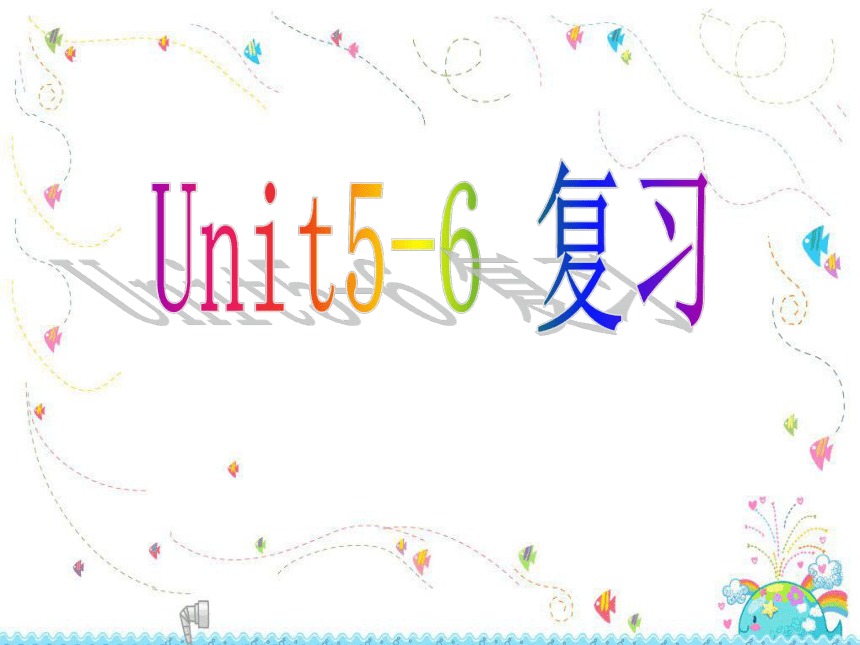 | |
| 格式 | zip | ||
| 文件大小 | 1.0MB | ||
| 资源类型 | 教案 | ||
| 版本资源 | 仁爱科普版 | ||
| 科目 | 英语 | ||
| 更新时间 | 2018-04-15 16:01:49 | ||
图片预览

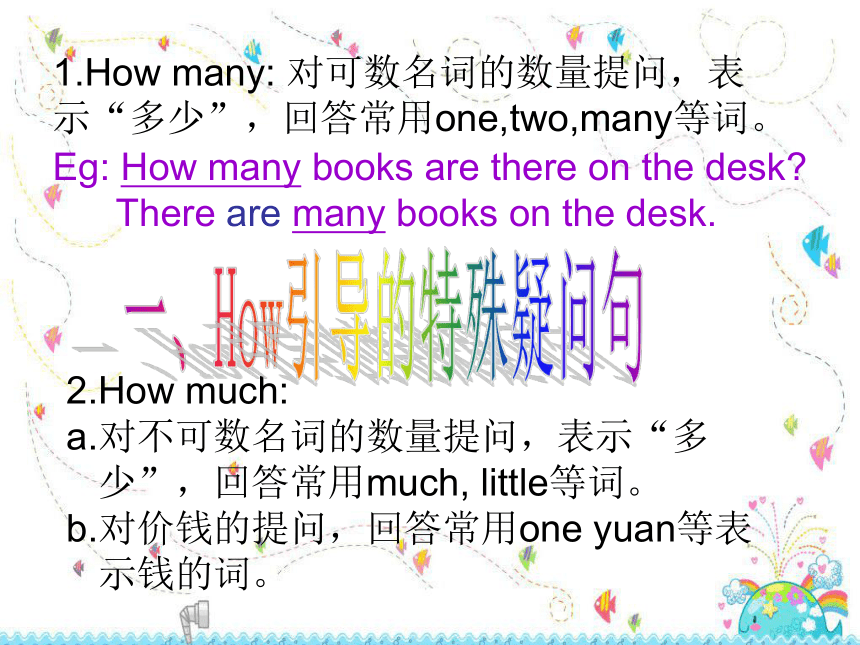
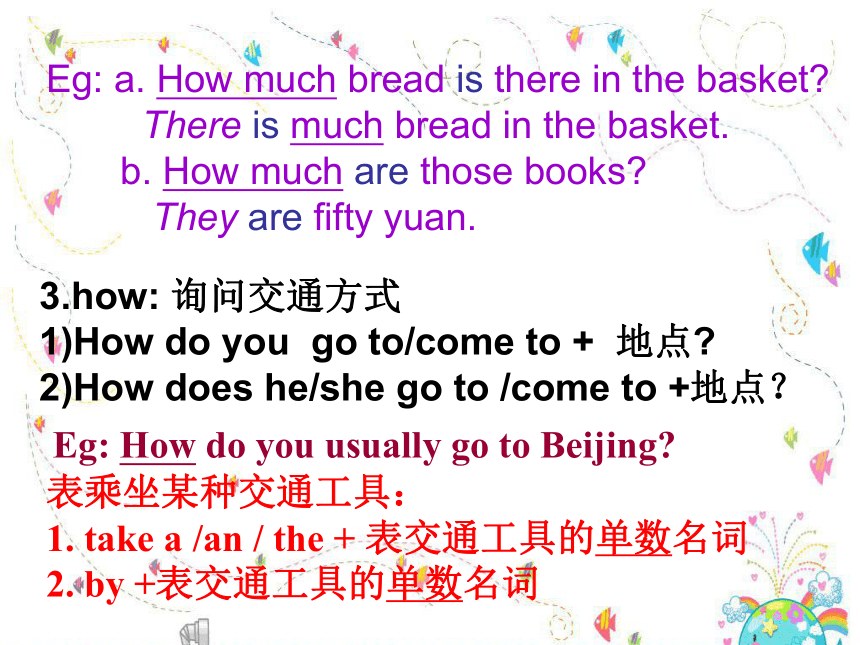
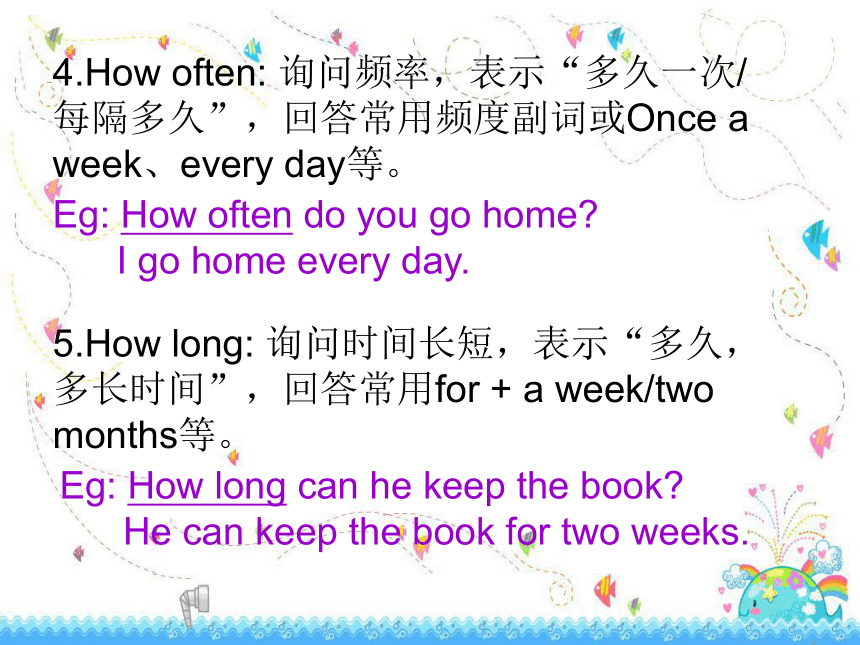
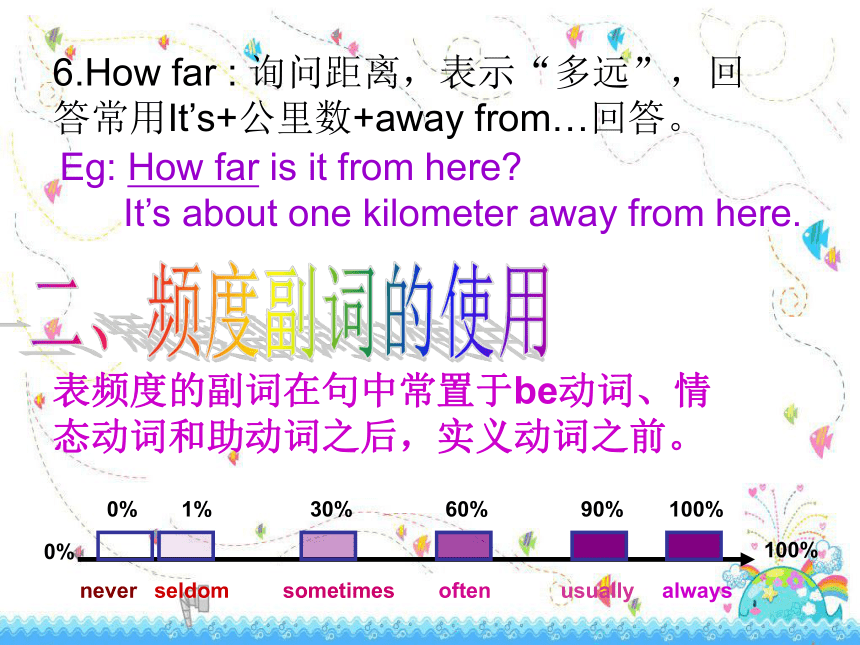

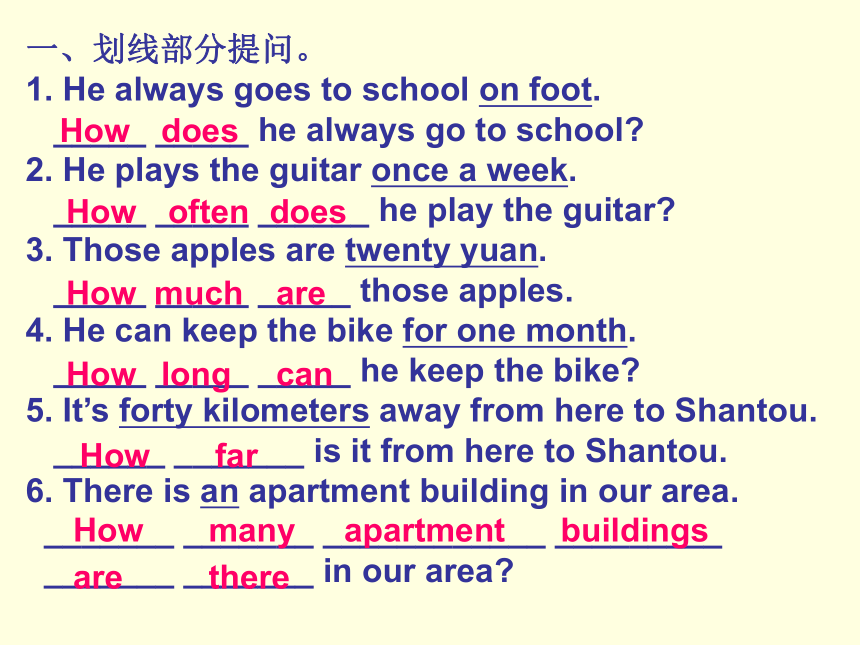
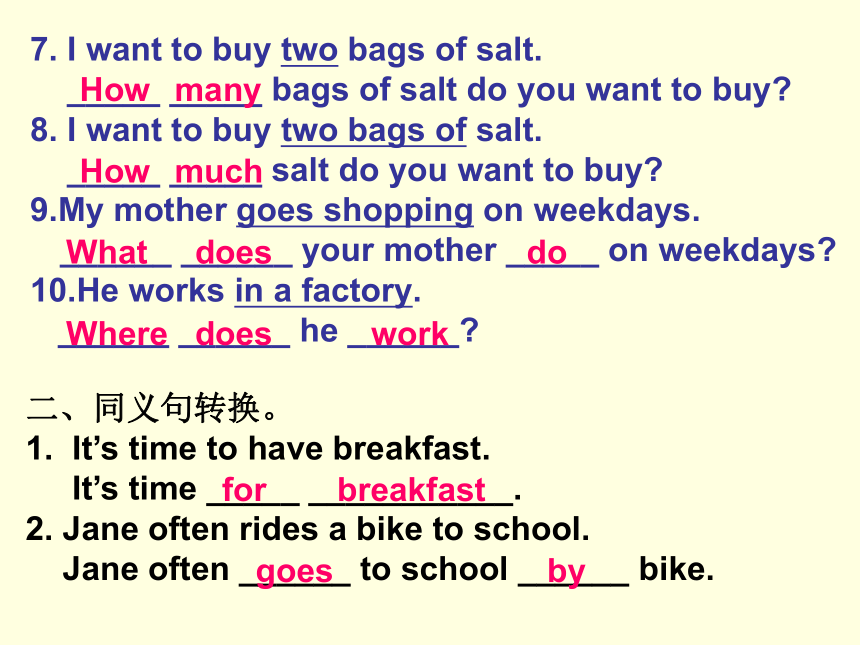

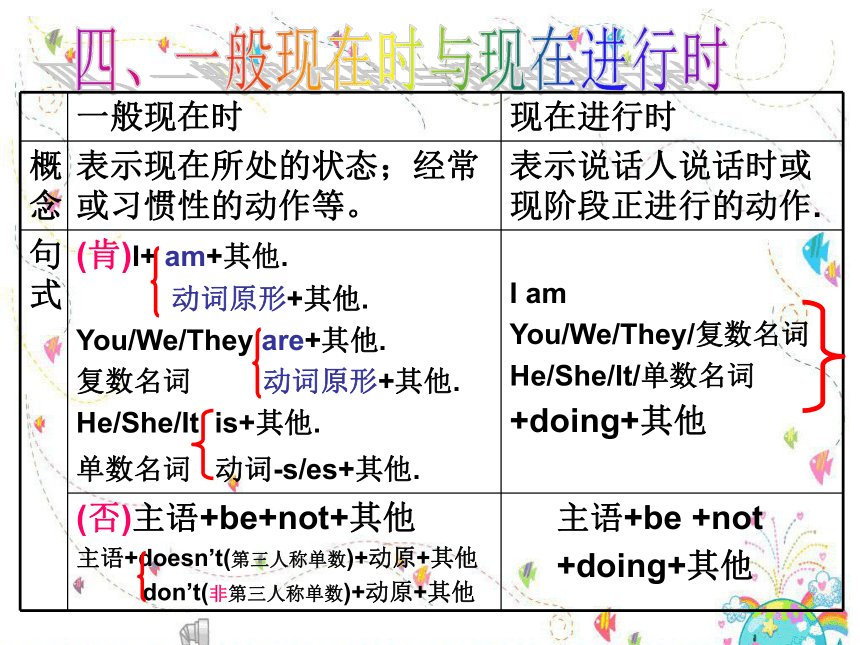
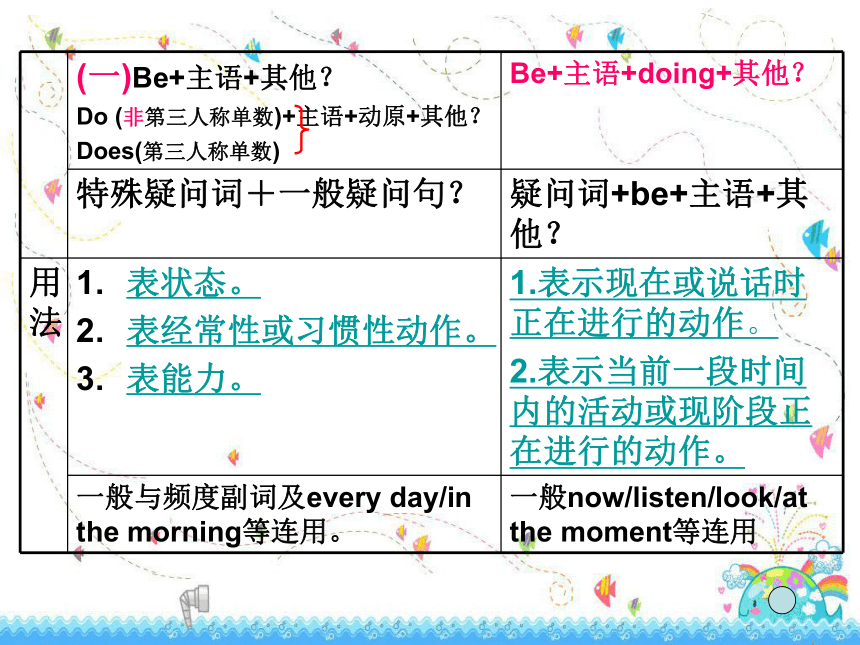
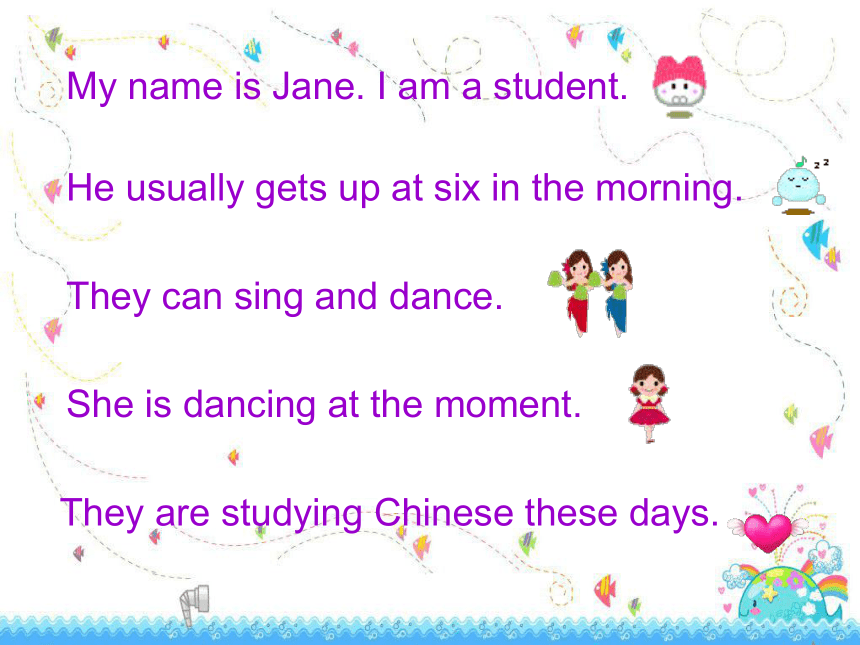
文档简介
课件32张PPT。Unit5-6 复习1.How many: 对可数名词的数量提问,表示“多少”,回答常用one,two,many等词。Eg: How many books are there on the desk?
There are many books on the desk.2.How much:
对不可数名词的数量提问,表示“多少”,回答常用much, little等词。
对价钱的提问,回答常用one yuan等表示钱的词。一、How引导的特殊疑问句Eg: a. How much bread is there in the basket?
There is much bread in the basket.
b. How much are those books?
They are fifty yuan.3.how: 询问交通方式
1)How do you go to/come to + 地点?
2)How does he/she go to /come to +地点?Eg: How do you usually go to Beijing?表乘坐某种交通工具:
1. take a /an / the + 表交通工具的单数名词
2. by +表交通工具的单数名词4.How often: 询问频率,表示“多久一次/每隔多久”,回答常用频度副词或Once a week、every day等。Eg: How often do you go home?
I go home every day.5.How long: 询问时间长短,表示“多久,多长时间”,回答常用for + a week/two months等。Eg: How long can he keep the book?
He can keep the book for two weeks.6.How far : 询问距离,表示“多远”,回答常用It’s+公里数+away from…回答。Eg: How far is it from here?
It’s about one kilometer away from here.二、频度副词的使用表频度的副词在句中常置于be动词、情态动词和助动词之后,实义动词之前。neverseldomsometimesoftenusuallyalways0%100%0%1%30%60%90%100%三、交通方式的表达方法一、划线部分提问。
1. He always goes to school on foot.
_____ _____ he always go to school?
2. He plays the guitar once a week.
_____ _____ ______ he play the guitar?
3. Those apples are twenty yuan.
_____ _____ _____ those apples.
4. He can keep the bike for one month.
_____ _____ _____ he keep the bike?
5. It’s forty kilometers away from here to Shantou.
______ _______ is it from here to Shantou.
6. There is an apartment building in our area.
_______ _______ ____________ _________
_______ _______ in our area? HowHowHowHowHowmuchoftendoesHowdoeslongthereapartmentmanyarecanfararebuildings7. I want to buy two bags of salt.
_____ _____ bags of salt do you want to buy?
8. I want to buy two bags of salt.
_____ _____ salt do you want to buy?
9.My mother goes shopping on weekdays.
______ ______ your mother _____ on weekdays?
10.He works in a factory.
______ ______ he ______?二、同义句转换。
1. It’s time to have breakfast.
It’s time _____ ___________.
2. Jane often rides a bike to school.
Jane often ______ to school ______ bike.HowHowmuchmanyWhatdoesdoesdoWhereworkbreakfastforbygoes3.Mary goes to school on foot.
Mary ______ _____ school.
4.We go home by subway.
We _____ _____ ________ home.
5. What’s the time?
______ ______ is it?三、完成句子。
We want to __________ (了解) your school life.
He _____________ (看起来快乐) because he loves swimming in the swimming pool.
She often read story books _______________(在空余时间).
We often __________________ (有短暂休息) after lunch.
What do you do ________________ (在上学期间)?walkssubwaythetaketimeWhattoknow aboutlooks happyin her free timehave a short breakon school days四、一般现在时与现在进行时My name is Jane. I am a student. They can sing and dance. He usually gets up at six in the morning. She is dancing at the moment.They are studying Chinese these days.哪些主语属第三人称单数?1.单数第三人称代词he, she, it单独作主语。3.单数可数名词(如the girl, that cat)作主语。2.单个人名或称呼(如Tom, Miss Lin)作主语。4.不可数名词(如the bread)作主语。5.不定代词(如anything, somebody)作主语。实义动词“第三人称单数”的变化规则:1.一般情况下,直接在词尾加-s。
如:sing—sings, sleep—sleeps 2.以s, x或ch, sh结尾的词,后加-es。
如:guess—guesses, watch—watches 3.以辅音字母+o结尾的词,后加-es。
如:go—goes, do—does 4.以辅音字母+y结尾的词,变y为i再加-es;
以元音字母+y结尾的词,直接在词尾加-s。
如:study—studies, say—says 5.be—is, have—has
现在进行时中V-ing的变化规则:一般在单词后加ing。
eg: be----being play----playingb. 以不发音的e 结尾,去e,加ing。
eg: take----taking come---comingc. 以一个辅音字母加一个元音字母结尾的重读闭音节的单词,双写辅音字母+ing。
eg: run----running sit----sitting
get----getting put----putting
swim----swimming begin----beginning一、用动词的正确形式填空。
1.Joy always_________(play) her toy in her room.
2.Joy __________(play) her toy in her room now.
3.He often _______(do) his homework in the evening , but now he __________ (watch) TV now?
4. The boy ______(play) basketball every afternoon.
5.The boy is over there. He ___________(play) basketball
playsis playingdoesis watchingplaysis playing6. Lily ______(like) watching TV. She _________(watch) TV every evening. But now she ____________(not watch) TV. She __________(read) an English book.
7. -Listen! Who _________(sing) in the next room? -I think it's Li Mei. She often ______(sing) in the next room. And she ______(sing) well.
likeswatchesisn’t watching is reading is singing sings sings 二、划线部分提问。
1. Mike is playing computer games.
_________ Mike _______ ?
2. His favorite sport is swimming.
_____ _____ his favorite sport?
3. He likes playing football best.
_____ _____ he _____ ______ best?
4. We often clean the classroom on Friday afternoon.
_____ _____ we _____ on Friday afternoon?
5. We are cleaning the classroom.
_____ are you ________ ?
6. My sister is reading in the study.
_______ ______ your sister _______?readingisWheredoinglikedodoWhatdoingWhatisWhatdoesWhatdoingWhat’s三、句型转换。
1. Running is my favorite sport. (同义句转换)
I ________ running ________.
2. Jane would like me to help her carry the box. (同上)
Jane ______ ______ _____ _____her carry the box.
3. I’m making a cake now. (改为否定句)
______ ______ ________ a cake now.
4. Tom seldom goes to the English corner. (同上)
Tom ________ seldom _____ to the English corner.
5. Tom is speaking English at the English corner. (同上)
Tom _____ ________ English at the English corner.
6. Jane is cleaning the room now. (改为疑问句)
_____ Jane __________ the room now?
7. Jane cleans the room every day. (同上)
_____ Jane ______ the room every day?
likebesttomewantshelpmakingnotI’mdoesn’tgoisn’tspeakingcleaningcleanDoesIs8. Tom and Jim are sleeping in the dormitory. (同上)
______ Tom and Jim __________ in the dormitory?
9. He reads books every day. (用now改写句子)
_______________________ now.
10. They are having an art class now. (用on Monday改写句子)
_________________________ On Monday.
11. I’m running on the playground.
(改为一般疑问句并作肯、否定回答)
_____ you __________ on the playground?
_____, ______ ______.
_____, ______ ______.
12. Jane goes to the factory on weekdays. (同上)
______ Jane ______ to the factory on weekdays.
_____, ______ ______.
_____, ______ _________.
AreIYessleepingHe is reading books They have an art classArerunningamI’mnotDoesgoYesNoNosheshedoesn’tdoes(1)概念:表示某地有或存在某物或某人。(2)主体结构:There be(is/are) + 某物/人 + 地点/某时There is a computer in my study.
There are some girls in the classroom.(3)There be的各种句式:a. 肯定句There is+ +某地/某时
There are+ 可数名词复数形式+某地/某时a/an+可数名词的单数
不可数名词 五、There be结构There is a computer in my study.
There is some water in the glass.
There are four classes in the morning.b. 否定句There isn’t+ +某地/某时
There aren’t+ 可数名词复数形式+某地/某时a/an+可数名词的单数
不可数名词 There isn’t a computer in my study.
There isn’t some water in the glass.
There aren’t four classes in the morning.c. 一般疑问句及其回答:Is there+ +某地/某时?
Are there+ 可数名词复数形式+某地/某时?a/an+可数名词的单数
不可数名词 Yes, there is./No, there isn’t.
是的,有。/不,没有。
Yes, there are./No, there aren’t.Is there a book on the desk?
Yes, there is./No, there isn’t.
Are there some books on the desk?
Yes, there are./No, there aren’t.There are some boys in the classroom.
There aren’t any boys in the classroom.d.特殊疑问句:特殊疑问词(如:How many
/How much等)+一般疑问句+?How many students are there in our school?
How much water is there in the glass?Attention:1.对”某地有某物“提问要用”What’s+某地+?”句型,中间通常不用there。Eg: What’s in your bag?
There are some books in my bag.2.不能将there be写成there have.Eg: There have an English class every day.
There are having an English class every
day.
There is an English class every day.3.在there be结构中,be后若有多个主语,be(is/are)的变化应根据靠近它的那个主语而定。若靠近它的那个是可数单数名词或不可数名词,则用is;若靠近它的那个是可数名词复数,则用are。Eg: There is an apple, two cakes and a
glass of milk in the bottle.
There are two cakes, an apple and a
glass of milk in the bottle.There be结构与have/has的区别 There be句型表示某处有某人或某物,强调的是一种客观存在;
have/has表示“某人或某物有……”强调的是拥有或占有。I have a story book.
There is a story book on the desk.一、划线部分提问。
1. Mary likes living here because she loves the people and the food here.
______ _______ Mary like living here?
2. I don’t like this bike because it’s too old.
______ _______ you like this bike?
3. They are having an art class.
_____ _____ they _______?
4. They are having an art class.
_____ class _____ they having?
5. It’s Friday today.
_____ ______ is it today?
6. Jane has four classes in the morning.
_____ _____ ________ Jane _____ in the morning.classesmanyHowhavedoingareWhatdayWhatdon’tWhyareWhatdoesWhy7. The first class begins at 8 o’clock.
______ _______ ______ the first class ______?
8. There is a pen and some books on my desk. _______ _______ my desk?
9. There are some keys in the drawer?
_______ _______ the drawer?
10. There are five birds in the tree.
________ _________ birds are there in the tree?
11. There is two bottles of milk on the table. ________ _________ milk is there on the table?
12. There is two bottles of milk on the table. ________ _________ bottles of milk are there on the table?
13. The book is interesting.
______ ______ the book?
muchmanyHowonbegintimeinWhat’sdoesWhatWhat’sHowHowmanyHowis二、句型转换。
1. How do you like English? (同义句转换)
________ do you ________ ______ English?
2. What time does school finish? (同上)
What time ______ school _______ ?
3. A week has seven days. (同上)
______ ______ seven ______ ______ a week.
4. There is some bread on the table. (改为一般疑问句)
_____ there _______ bread on the table?
5. There are some girls in the garden. (同上)
________ there _______ girls in the garden?
6. There are five elephants in the zoo. (改为单数形式)
There _____ _____ elephant in the zoo.WhatthinkoverisofThereindaysareIsanyAreanyanis7. There are some teachers in the teachers’ room.
(改为否定句)
There ______ ______ teachers in the teachers’ room.
8. Is there a radio on your desk? (否定回答)
_______ , ________ _________.
9. Are there any clocks on the wall? (肯定回答)
_______ , ________ _________.
10. Susan likes English best. (用not…at all改写)
Susan _________ ______ English _____ ______.
aren’tYesanyareisn’tNotheretheredoesn’tlikeatallThank you for listening!
There are many books on the desk.2.How much:
对不可数名词的数量提问,表示“多少”,回答常用much, little等词。
对价钱的提问,回答常用one yuan等表示钱的词。一、How引导的特殊疑问句Eg: a. How much bread is there in the basket?
There is much bread in the basket.
b. How much are those books?
They are fifty yuan.3.how: 询问交通方式
1)How do you go to/come to + 地点?
2)How does he/she go to /come to +地点?Eg: How do you usually go to Beijing?表乘坐某种交通工具:
1. take a /an / the + 表交通工具的单数名词
2. by +表交通工具的单数名词4.How often: 询问频率,表示“多久一次/每隔多久”,回答常用频度副词或Once a week、every day等。Eg: How often do you go home?
I go home every day.5.How long: 询问时间长短,表示“多久,多长时间”,回答常用for + a week/two months等。Eg: How long can he keep the book?
He can keep the book for two weeks.6.How far : 询问距离,表示“多远”,回答常用It’s+公里数+away from…回答。Eg: How far is it from here?
It’s about one kilometer away from here.二、频度副词的使用表频度的副词在句中常置于be动词、情态动词和助动词之后,实义动词之前。neverseldomsometimesoftenusuallyalways0%100%0%1%30%60%90%100%三、交通方式的表达方法一、划线部分提问。
1. He always goes to school on foot.
_____ _____ he always go to school?
2. He plays the guitar once a week.
_____ _____ ______ he play the guitar?
3. Those apples are twenty yuan.
_____ _____ _____ those apples.
4. He can keep the bike for one month.
_____ _____ _____ he keep the bike?
5. It’s forty kilometers away from here to Shantou.
______ _______ is it from here to Shantou.
6. There is an apartment building in our area.
_______ _______ ____________ _________
_______ _______ in our area? HowHowHowHowHowmuchoftendoesHowdoeslongthereapartmentmanyarecanfararebuildings7. I want to buy two bags of salt.
_____ _____ bags of salt do you want to buy?
8. I want to buy two bags of salt.
_____ _____ salt do you want to buy?
9.My mother goes shopping on weekdays.
______ ______ your mother _____ on weekdays?
10.He works in a factory.
______ ______ he ______?二、同义句转换。
1. It’s time to have breakfast.
It’s time _____ ___________.
2. Jane often rides a bike to school.
Jane often ______ to school ______ bike.HowHowmuchmanyWhatdoesdoesdoWhereworkbreakfastforbygoes3.Mary goes to school on foot.
Mary ______ _____ school.
4.We go home by subway.
We _____ _____ ________ home.
5. What’s the time?
______ ______ is it?三、完成句子。
We want to __________ (了解) your school life.
He _____________ (看起来快乐) because he loves swimming in the swimming pool.
She often read story books _______________(在空余时间).
We often __________________ (有短暂休息) after lunch.
What do you do ________________ (在上学期间)?walkssubwaythetaketimeWhattoknow aboutlooks happyin her free timehave a short breakon school days四、一般现在时与现在进行时My name is Jane. I am a student. They can sing and dance. He usually gets up at six in the morning. She is dancing at the moment.They are studying Chinese these days.哪些主语属第三人称单数?1.单数第三人称代词he, she, it单独作主语。3.单数可数名词(如the girl, that cat)作主语。2.单个人名或称呼(如Tom, Miss Lin)作主语。4.不可数名词(如the bread)作主语。5.不定代词(如anything, somebody)作主语。实义动词“第三人称单数”的变化规则:1.一般情况下,直接在词尾加-s。
如:sing—sings, sleep—sleeps 2.以s, x或ch, sh结尾的词,后加-es。
如:guess—guesses, watch—watches 3.以辅音字母+o结尾的词,后加-es。
如:go—goes, do—does 4.以辅音字母+y结尾的词,变y为i再加-es;
以元音字母+y结尾的词,直接在词尾加-s。
如:study—studies, say—says 5.be—is, have—has
现在进行时中V-ing的变化规则:一般在单词后加ing。
eg: be----being play----playingb. 以不发音的e 结尾,去e,加ing。
eg: take----taking come---comingc. 以一个辅音字母加一个元音字母结尾的重读闭音节的单词,双写辅音字母+ing。
eg: run----running sit----sitting
get----getting put----putting
swim----swimming begin----beginning一、用动词的正确形式填空。
1.Joy always_________(play) her toy in her room.
2.Joy __________(play) her toy in her room now.
3.He often _______(do) his homework in the evening , but now he __________ (watch) TV now?
4. The boy ______(play) basketball every afternoon.
5.The boy is over there. He ___________(play) basketball
playsis playingdoesis watchingplaysis playing6. Lily ______(like) watching TV. She _________(watch) TV every evening. But now she ____________(not watch) TV. She __________(read) an English book.
7. -Listen! Who _________(sing) in the next room? -I think it's Li Mei. She often ______(sing) in the next room. And she ______(sing) well.
likeswatchesisn’t watching is reading is singing sings sings 二、划线部分提问。
1. Mike is playing computer games.
_________ Mike _______ ?
2. His favorite sport is swimming.
_____ _____ his favorite sport?
3. He likes playing football best.
_____ _____ he _____ ______ best?
4. We often clean the classroom on Friday afternoon.
_____ _____ we _____ on Friday afternoon?
5. We are cleaning the classroom.
_____ are you ________ ?
6. My sister is reading in the study.
_______ ______ your sister _______?readingisWheredoinglikedodoWhatdoingWhatisWhatdoesWhatdoingWhat’s三、句型转换。
1. Running is my favorite sport. (同义句转换)
I ________ running ________.
2. Jane would like me to help her carry the box. (同上)
Jane ______ ______ _____ _____her carry the box.
3. I’m making a cake now. (改为否定句)
______ ______ ________ a cake now.
4. Tom seldom goes to the English corner. (同上)
Tom ________ seldom _____ to the English corner.
5. Tom is speaking English at the English corner. (同上)
Tom _____ ________ English at the English corner.
6. Jane is cleaning the room now. (改为疑问句)
_____ Jane __________ the room now?
7. Jane cleans the room every day. (同上)
_____ Jane ______ the room every day?
likebesttomewantshelpmakingnotI’mdoesn’tgoisn’tspeakingcleaningcleanDoesIs8. Tom and Jim are sleeping in the dormitory. (同上)
______ Tom and Jim __________ in the dormitory?
9. He reads books every day. (用now改写句子)
_______________________ now.
10. They are having an art class now. (用on Monday改写句子)
_________________________ On Monday.
11. I’m running on the playground.
(改为一般疑问句并作肯、否定回答)
_____ you __________ on the playground?
_____, ______ ______.
_____, ______ ______.
12. Jane goes to the factory on weekdays. (同上)
______ Jane ______ to the factory on weekdays.
_____, ______ ______.
_____, ______ _________.
AreIYessleepingHe is reading books They have an art classArerunningamI’mnotDoesgoYesNoNosheshedoesn’tdoes(1)概念:表示某地有或存在某物或某人。(2)主体结构:There be(is/are) + 某物/人 + 地点/某时There is a computer in my study.
There are some girls in the classroom.(3)There be的各种句式:a. 肯定句There is+ +某地/某时
There are+ 可数名词复数形式+某地/某时a/an+可数名词的单数
不可数名词 五、There be结构There is a computer in my study.
There is some water in the glass.
There are four classes in the morning.b. 否定句There isn’t+ +某地/某时
There aren’t+ 可数名词复数形式+某地/某时a/an+可数名词的单数
不可数名词 There isn’t a computer in my study.
There isn’t some water in the glass.
There aren’t four classes in the morning.c. 一般疑问句及其回答:Is there+ +某地/某时?
Are there+ 可数名词复数形式+某地/某时?a/an+可数名词的单数
不可数名词 Yes, there is./No, there isn’t.
是的,有。/不,没有。
Yes, there are./No, there aren’t.Is there a book on the desk?
Yes, there is./No, there isn’t.
Are there some books on the desk?
Yes, there are./No, there aren’t.There are some boys in the classroom.
There aren’t any boys in the classroom.d.特殊疑问句:特殊疑问词(如:How many
/How much等)+一般疑问句+?How many students are there in our school?
How much water is there in the glass?Attention:1.对”某地有某物“提问要用”What’s+某地+?”句型,中间通常不用there。Eg: What’s in your bag?
There are some books in my bag.2.不能将there be写成there have.Eg: There have an English class every day.
There are having an English class every
day.
There is an English class every day.3.在there be结构中,be后若有多个主语,be(is/are)的变化应根据靠近它的那个主语而定。若靠近它的那个是可数单数名词或不可数名词,则用is;若靠近它的那个是可数名词复数,则用are。Eg: There is an apple, two cakes and a
glass of milk in the bottle.
There are two cakes, an apple and a
glass of milk in the bottle.There be结构与have/has的区别 There be句型表示某处有某人或某物,强调的是一种客观存在;
have/has表示“某人或某物有……”强调的是拥有或占有。I have a story book.
There is a story book on the desk.一、划线部分提问。
1. Mary likes living here because she loves the people and the food here.
______ _______ Mary like living here?
2. I don’t like this bike because it’s too old.
______ _______ you like this bike?
3. They are having an art class.
_____ _____ they _______?
4. They are having an art class.
_____ class _____ they having?
5. It’s Friday today.
_____ ______ is it today?
6. Jane has four classes in the morning.
_____ _____ ________ Jane _____ in the morning.classesmanyHowhavedoingareWhatdayWhatdon’tWhyareWhatdoesWhy7. The first class begins at 8 o’clock.
______ _______ ______ the first class ______?
8. There is a pen and some books on my desk. _______ _______ my desk?
9. There are some keys in the drawer?
_______ _______ the drawer?
10. There are five birds in the tree.
________ _________ birds are there in the tree?
11. There is two bottles of milk on the table. ________ _________ milk is there on the table?
12. There is two bottles of milk on the table. ________ _________ bottles of milk are there on the table?
13. The book is interesting.
______ ______ the book?
muchmanyHowonbegintimeinWhat’sdoesWhatWhat’sHowHowmanyHowis二、句型转换。
1. How do you like English? (同义句转换)
________ do you ________ ______ English?
2. What time does school finish? (同上)
What time ______ school _______ ?
3. A week has seven days. (同上)
______ ______ seven ______ ______ a week.
4. There is some bread on the table. (改为一般疑问句)
_____ there _______ bread on the table?
5. There are some girls in the garden. (同上)
________ there _______ girls in the garden?
6. There are five elephants in the zoo. (改为单数形式)
There _____ _____ elephant in the zoo.WhatthinkoverisofThereindaysareIsanyAreanyanis7. There are some teachers in the teachers’ room.
(改为否定句)
There ______ ______ teachers in the teachers’ room.
8. Is there a radio on your desk? (否定回答)
_______ , ________ _________.
9. Are there any clocks on the wall? (肯定回答)
_______ , ________ _________.
10. Susan likes English best. (用not…at all改写)
Susan _________ ______ English _____ ______.
aren’tYesanyareisn’tNotheretheredoesn’tlikeatallThank you for listening!
同课章节目录
- Unit 5 Our school life
- Topic 1 I usually come to school by subway.
- Topic 2 A few students are running around the play
- Topic 3 My school life is very interesting.
- Unit 6 Our local area
- Topic 1 Is there a computer in your study?
- Topic 2 My home is in an apartment building.
- Topic 3 Which is the way to the hospital?
- Review of Units 5-6
- Unit 7 The Birthday
- Topic 1 When is your birthday?
- Topic 2 Can you sing an English song?
- Topic 3 Everyone had a good time.
- Unit 8 The seasons and the Weathe
- Topic 1 What's the weather like in summer?
- Topic 2 The summer holidays are coming.
- Topic 3 Let’s celebrate!
- Review of Units 7-8
- 旧版资料
- Unit 5 Our School Life
- Unit 6 Our Local Area
- Unit 7 The Birthday
- Unit 8 The seasons and the Weathe
- Unit 7 Celebrating the Birthday(老版本)
